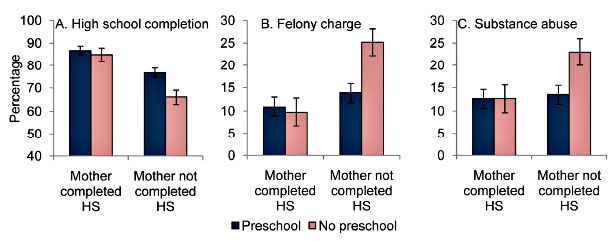Suzy Khimm has an interesting piece today about Oklahoma’s universal pre-K program, which started up after it was passed in a 1998 law. Here’s an excerpt:
In studies published in Science and the Policy Studies Journal, Gormley and his co-authors found that the pre-K programs in Tulsa significantly improved young children’s ability to identify letters, spell and solve problems—leaping an average of five months ahead in pre-math and nine months ahead in pre-reading skills. “Those are really big gains,” Gormley said. “Oklahoma decided that it was a waste of time and money to have a low quality program, so it decided to have high quality programs which can produce really big improvement in school readiness for a wide range of children.”
….However, there’s still limited evidence of the long-term impact of a strong pre-K education for certain groups of children—and whether it’s really the best kind of intervention….The Heritage Foundation points out, for instance, that fourth-grade reading scores in Oklahoma have actually declined since universal pre-K has been implemented. “Oklahoma was the only state to see a significant score decrease on the NAEP fourth-grade reading assessment and is the only state to see its reading scores decline over the 15 years from 1992 though 2007 out of all of the states that participated in the fourth-grade reading test in 1992,” Heritage fellow Lindsey Burke wrote in 2009.
I’ll try to have more to say about this later, but just as a quick comment, I’d warn against paying too much attention to raw academic achievement results. That stuff is important, but a lot of the research on pre-K suggests that, in fact, its long-term effect on reading and math test scores is fairly weak. However, pre-K does seem to increase high school completion rates; reduce rates of substance abuse; reduce felony rates; increase lifetime income; and improve non-IQ cognitive traits like the ability to delay gratification, the ability to hold a job, and the ability to control your temper. And that stuff is probably more important than an increase of a few points on the NAEP test. More here.
















